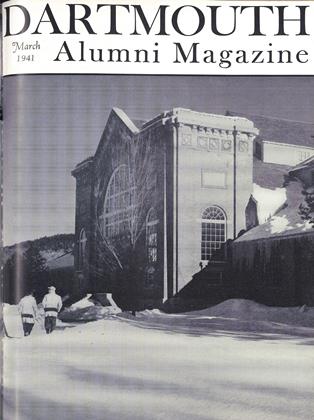IN THE FINAL settlement of the estate of the late Emil Bommer, Brooklyn manufacturer who died in 1935, Dartmouth College recently received a residuary bequest of approximately $500,000 in cash, securities and real estate. Under the terms of Mr. Bommer's will, the bequest will constitute an endowment fund for the education of male students only, with the restriction that none of the principal or income is to be used for instruction in the "socalled dead languages" or for maintenance of competitive athletics.
The present establishment of the Emil Bommer Fund at Dartmouth was made possible through a compromise agreement with surviving members of Mr. Bommer's family, following long and complicated negotiations effecting a settlement of litigation and claims. The final settlement, in which the legal interests of the College were handled by Thurlow M. Gordon '06, also gives Dartmouth a contingent remainder interest in several trust funds aggregating approximately 1130,000. About half of the bequest already received by the College is in cash and securities, the remainder being represented by about fifty parcels of real estate in Brooklyn.
Mr. Bommer, who made his fortune as a manufacturer of spring hinges, desired to leave a substantial portion of his estate to a college of wholly masculine character and became favorably interested in the tradition and educational aims of Dartmouth. He was a man of pronounced ideas which extended to the provision he made for education. In one of the most unusual bequests in the College's history, he stipulated that his legacy should "constitute an endowment fund to be known as the Emil Bommer Fund, such fund to be kept invested by the Trustees of Dartmouth College and the annual income thereof used for the benefit of said College in such manner as the Trustees thereof may direct for the education of persons of the male sex only, with the exception that none of the principal or income is to be expended for instruction in the so-called dead languages, but that language study shall be confined to the modern German, Spanish, English, and French languages in a manner sufficient to enable students to acquire a workable knowledge of such specified languages for commercial purposes and subject to the further condition that no part of the fund or income thereof shall be applied for the support, furtherance or maintenance of competitive athletic sports."
 View Full Issue
View Full Issue
More From This Issue
-
 Article
ArticleLewis Parkhurst, Trustee
March 1941 By Edward K.Robinson '04 -
 Article
ArticleGreece and Daniel Webster
March 1941 -
 Article
ArticleBig Green Teams
March 1941 By Whitey Fuller '37 -
 Article
ArticleThe Undergraduate Chair
March 1941 By Charles Bolte '41. -
 Class Notes
Class Notes1921*
March 1941 By CHARLES A. STICKNEY JR. -
 Article
ArticleA Generation Finding Itself
March 1941







